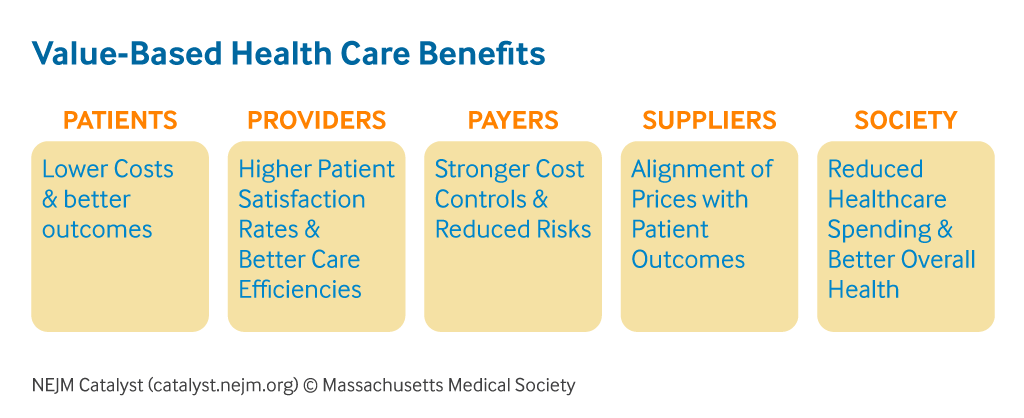The best way to think of value-based care is as outcome-based care. That’s because value-based care pays providers in keeping with patient health outcomes.
According to the New England Journal of Medicine, value-based care rewards providers for helping patients “improve their health, reduce the effects and incidence of chronic disease, and live healthier lives in an evidence-based way.” The “value” comes from measuring health outcomes against the cost of delivering the outcomes.

Patients are happy thanks to lower costs and better outcomes; doctors and hospitals are happy due to higher patient satisfaction scores resulting in more revenue. Payers, suppliers, and society at large also benefit through reduced patient risk, decreased spending, and improved population health.
The key to value-based care that drives the most revenue and patient satisfaction lies in building partnerships across service lines and with patients, management services, and post-acute care facilities—a delivery model where silos do not exist but where teams share data and coordinate care across the entire continuum.
Partnerships with Patients
Patients and their families must see themselves as partners with the clinical care teams taking responsibility for their care.
To affect positive outcomes, physicians must ensure patients fully understand their post-discharge care plan, medications and instructions, scheduled follow-up appointments, and what to watch out for concerning their condition.
Hospitals should work to provide patient navigators and engagement representatives who check in with patients after discharge to ensure everything is going according to plan and troubleshoot if that’s not the case.
The hospital benefits from improved transitions of care, enhanced integration with primary care, lower readmission rate and ED visits, and greater patient experience overall.
Partnerships Across Service Lines
Disparate, uncoordinated care between hospital departments results in poor communication that negatively affects performance metrics, patient and physician satisfaction, and most importantly, patient care.
On the other hand, when EM, HM, and ICU decide to integrate, care continuity improves, care transitions become smoother, and attention to documentation detail becomes a priority.
Other benefits of clinical integration include increased throughput, decreased ALOS, reduced readmission rates, and clearer communication with care management for discharge planning.
Proper documentation, in particular, is a critical component of value-based care. Enhanced documentation means better communication among the healthcare team, which can improve transitions of care for patients.
Robust and accurate documentation, coupled with accurate ICD-10 classification, offers clinicians a more complete perspective of the patient, resulting in more cost-effective care—both hallmarks of successful value-based care.
Post-Acute Care Partnerships
Hospitals must be able to place patients in the best possible location for their next stage of care. Partnerships with post-acute care (PAC) facilities can help ensure they are going to the proper level of care and will progress along their care plan, with the goal being to restore these patients to their homes as soon as possible.
The CMS Bundled Payments for Care Improvement Advanced (BPCI-A) model holds hospitals and providers financially responsible for post-acute care up to 90 days, including all in-patient rehab, skilled nursing facilities, long-term acute care, and home health charges.
Because PACs have the potential to be very expensive, it is in the hospital’s best interest to partner with a network it can trust for high-value care.
To create a trusted PACs network, ask the following questions:
- Does the facility have adequate clinician care (i.e., physicians, nurse practitioners)?
- Can we help make sure they do?
- How long is their average length of stay? Is that appropriate?
- What is the readmission rate for that facility? Can we help lower it?
Success in value-based care means making patient care after hospitalization a high priority. Improving post-discharge care through appropriate PAC placement reduces patient harm and saves money. The patient’s quality of life improves, and Medicare expenditures decrease.
Conclusion
Creating a sustainable value-based care system means approaching the entire care continuum from a partnership perspective. It encourages clinical integration, partnering with post-acute care facilities that align with your organization’s goals and values, and working with patients and their families to achieve an excellent standard of care along the way.
SCP Health is serious about helping your hospital achieve excellence in value-based care outcomes, especially considering CMS’s mandatory adoption of BPCI-A by 2024. To that end, earlier this year, we appointed Lisa Fry, an industry leader in value-based care partnerships and health management programs, as President, Value-Based Care, a new role within our company. Her primary charge is to expand value-based programs in our hospital and health system partners and extend our partnerships across the care continuum.






